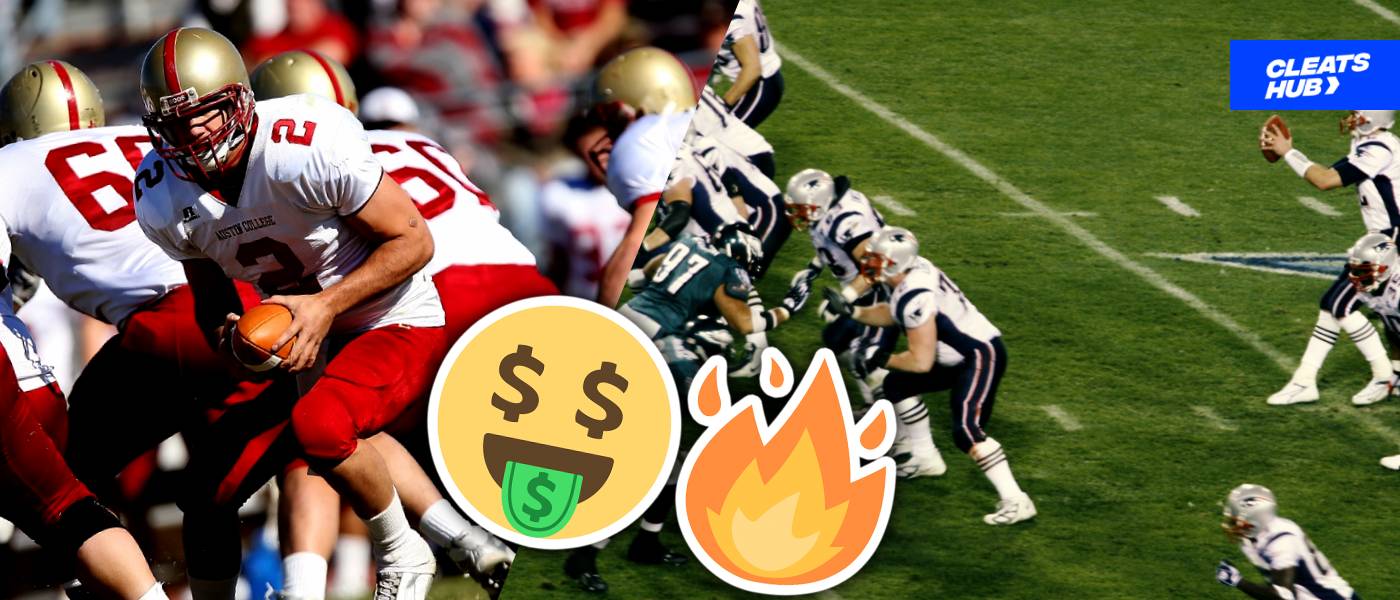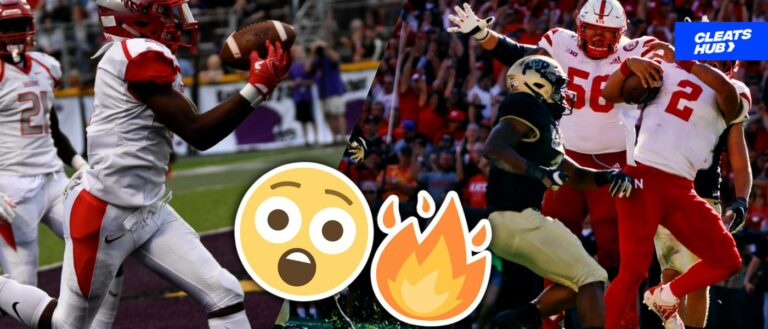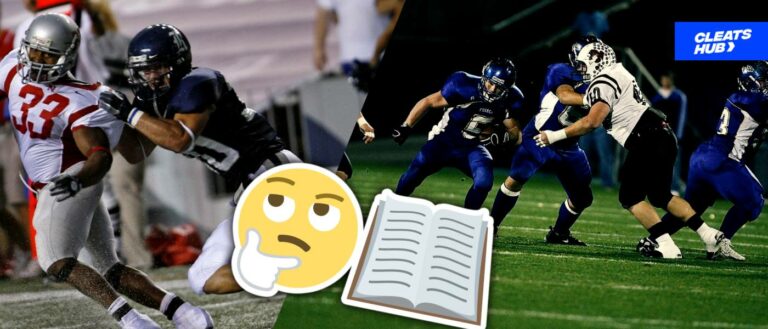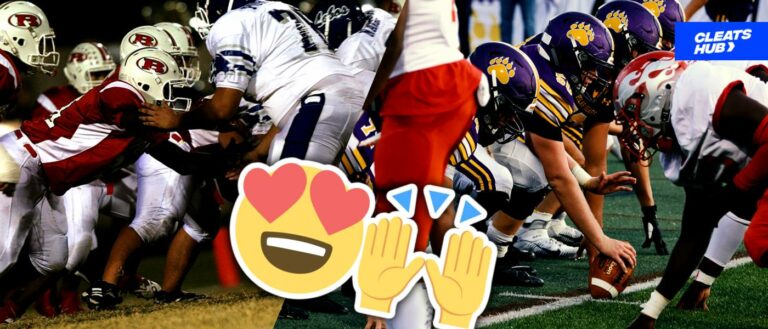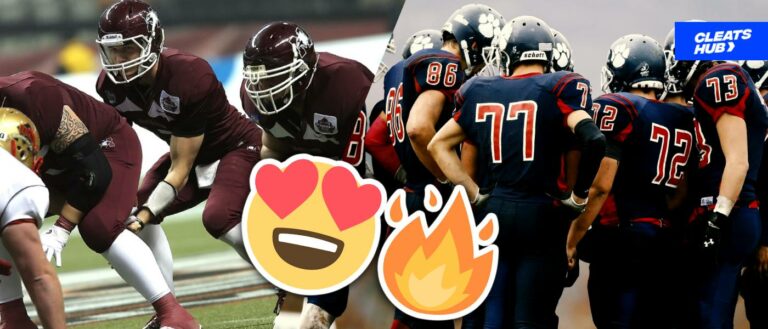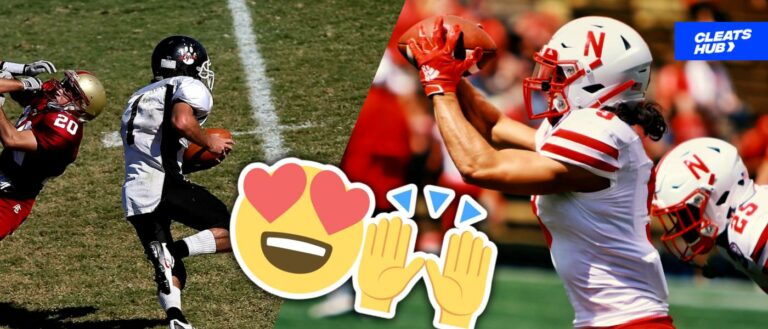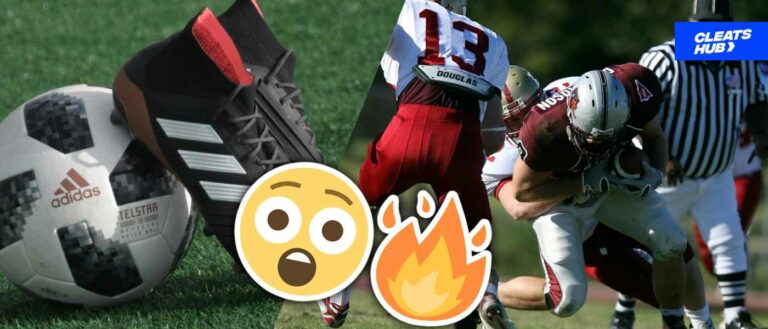Who Are The Quarterbacks In Football?
The quarterbacks are tactical and energetic leaders of any team, sometimes praised as the most crucial position in American football.
These field generals have a blend of physical prowess, cerebral clarity, and leadership characteristics that makes them the center of attention.
Here at Cleats Hub, we delve into the realm of quarterbacks, examining their function, capabilities, and effects on the contest.
Role of Quarterbacks
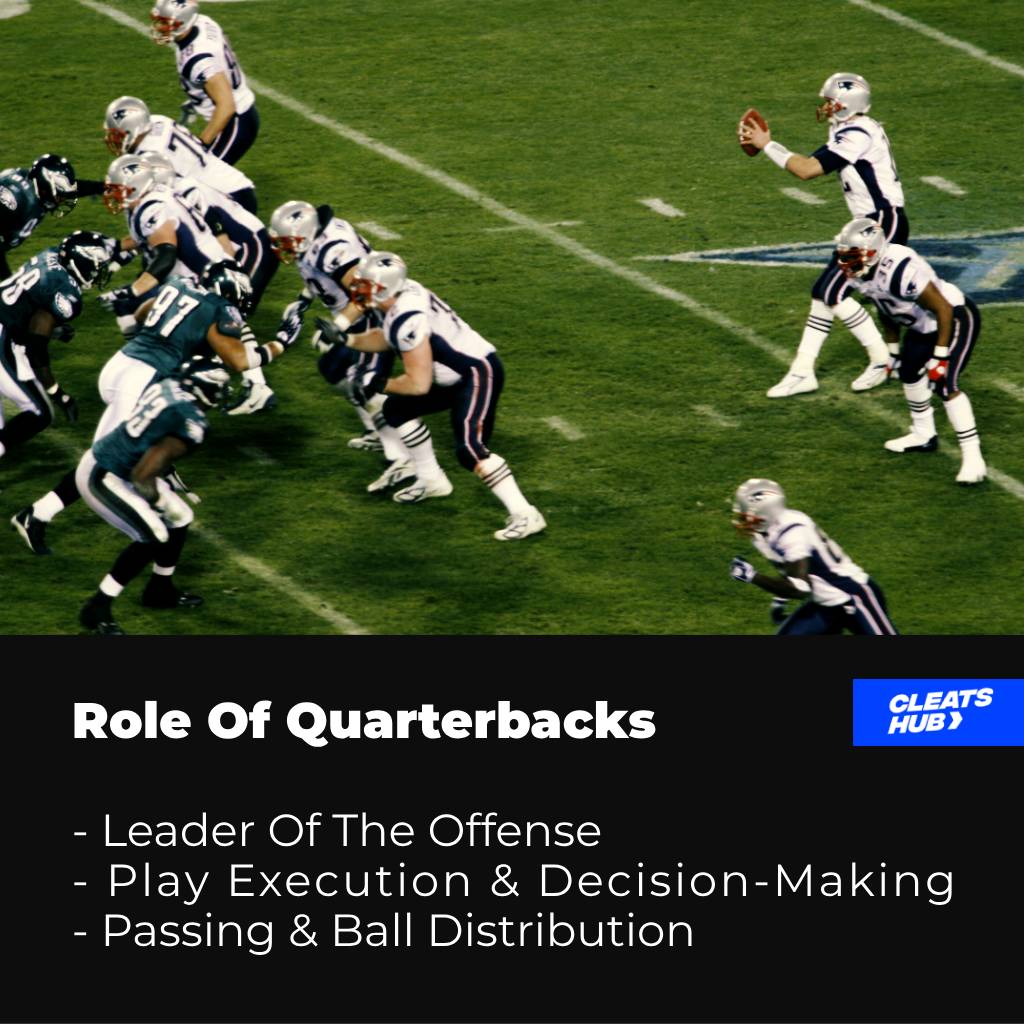
In American football, the quarterbacks play several roles essential to the team’s offensive performance.
The primary duties and functions of a quarterback are as follows:
Leader of the Offense
The quarterbacks lead the offensive unit and are in charge of calling plays and organizing the team’s field positioning.
Before the snap, they interact with teammates to make sure everyone is informed of their duties and responsibilities.
Play Execution and Decision-Making
Before each play, the quarterback delivers the play call to the squad after receiving it from the coaching staff. At the line of scrimmage, they assess the defensive alignment and, if necessary, make changes.
Moreover, defensive coverage forces the quarterback to make split-second judgments about potential passing routes or whether to hand the ball off to a running back.
Passing And Ball Distribution
A quarterback’s core responsibility is to deliver precise throws at the right moments to their intended recipients. They must be able to throw short, intermediate, and deep passes with accuracy and arm strength.
In addition, the key to sustaining a balanced and unexpected offense is the quarterback’s ability to distribute the ball to the receivers.
Reading Defensive Coverages
Quarterbacks need to be quick readers and analysts of defensive coverages. They examine the defenders’ position, picking up on any defensive flaws and spotting open receivers.
Secondly, they can take advantage of advantageous matchups and make intelligent selections about where to throw the ball thanks to this ability.
Audible and Pre-Snap Adjustments
The quarterback has the option to call an audible or make pre-snap modifications in reaction to defensive alignments or changes in game circumstances.
Based on their evaluation of the defense, they can alter the play at the line of scrimmage to put the offense in the best possible position to win.
Pocket Presence and Mobility
Some quarterbacks are excellent pocket passers, while others are mobile and can extend plays with their legs.
Secondly, quarterbacks need to be adept at avoiding pass rushers while keeping composure and throwing precise passes.
Moreover, mobile quarterbacks can also benefit from their running prowess by gaining yardage or evading pressure.
Skills of Great Quarterbacks
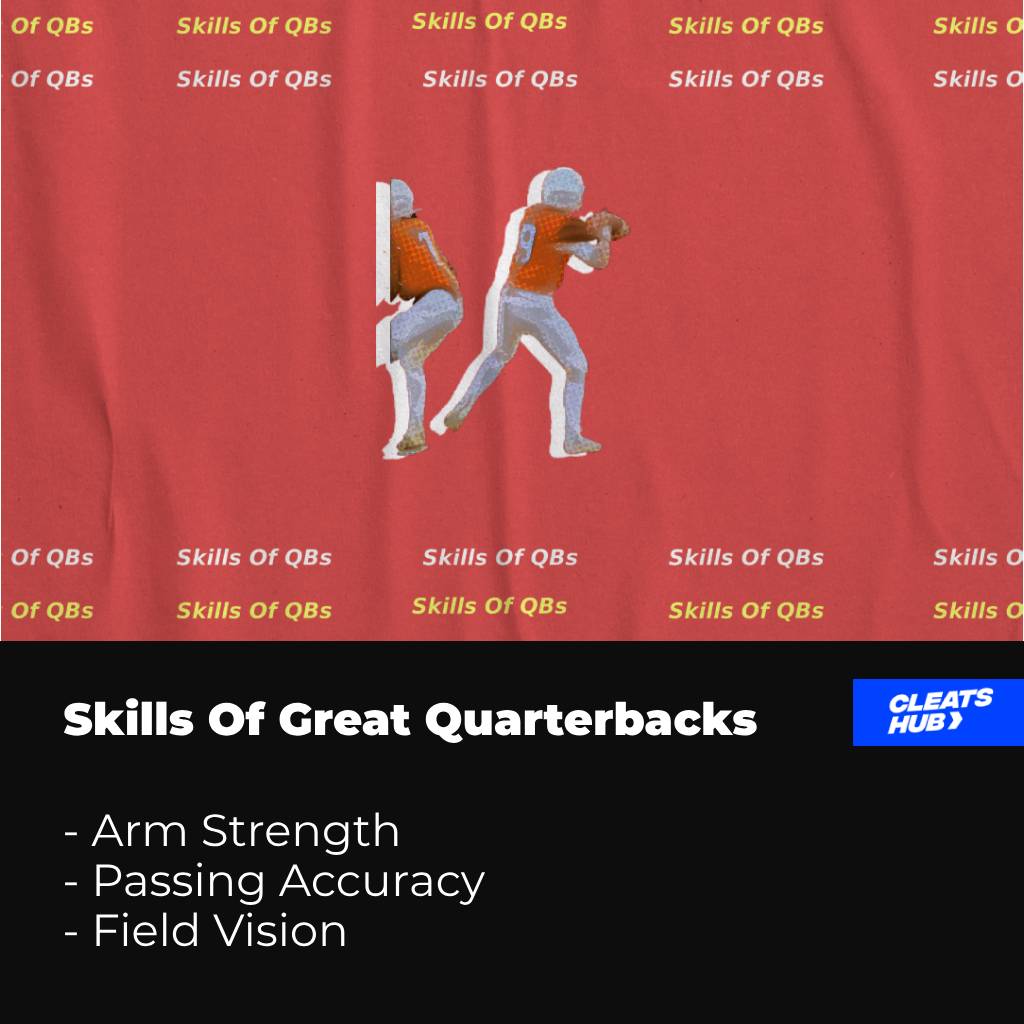
Arm Strength
A quarterback’s ability to create velocity and distance in their passes is at the heart of their skill set. The length of their arm dictates how far downfield they can throw the ball, which stretches the defense and creates room for huge plays.
Despite extreme pressure, quarterbacks with strong arms may navigate narrow openings and deliver accurate throws.
Passing Accuracy
Passing accuracy is just as important as arm strength. The ability of a quarterback to throw the ball precisely, hitting receivers in stride, is crucial.
Moreover, accuracy reduces the possibility of interceptions while ensuring that the intended target has the best opportunity to make a play.
In order to place the ball precisely where it has to go, successful quarterbacks must perfect the skills of touch, elegance, and timing.
Field Vision
The ability to scan the whole field, analyze defensive coverages, and identify open receivers is one of a quarterback’s most crucial abilities.
Moreover, an excellent field vision quarterback can absorb information rapidly, spot possible throwing routes, and take advantage of defensive deficiencies.
Furthermore, they can select the greatest alternative from a plethora of options thanks to their ability to make judgments in a split second.
Rules That Quarterbacks Have To Follow
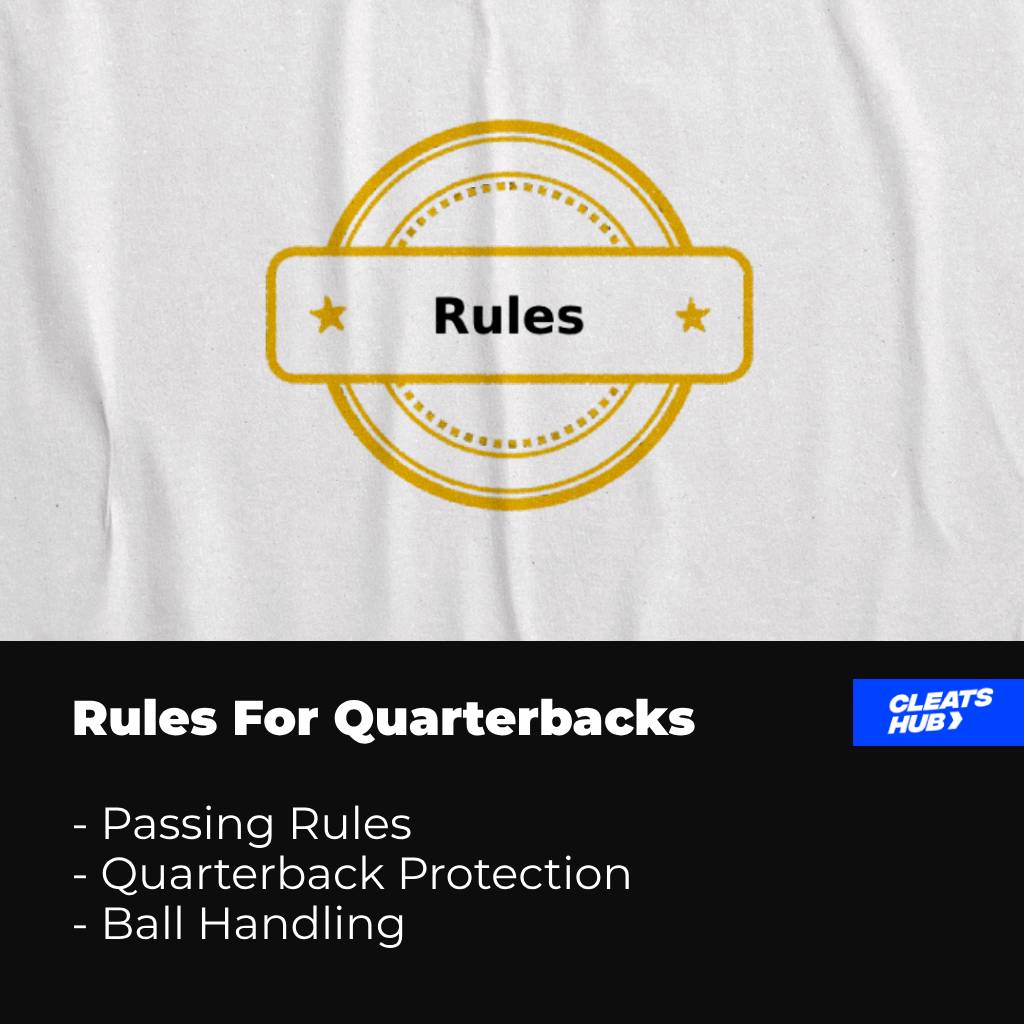
In American football, the activities of the quarterback are governed by several laws and rules.
The following are some guidelines that quarterbacks must adhere to:
Passing Rules for Quarterbacks
- Forward Pass:
From behind the line of scrimmage, the quarterback must release the ball and toss it to a receiver who is likewise positioned there. A forward pass, not a lateral or backward pass, must be made if the ball crosses the line of scrimmage. - Intentional Grounding:
A quarterback cannot intentionally ground the ball to escape a sack if there is no prospect of successful completion. The ball must reach the line of scrimmage before the quarterback may throw it away to prevent being sacked if they are outside the pocket. - Ineligible Receiver Downfield:
The quarterback must make sure that no offensive lineman who is not an eligible receiver has crossed the line of scrimmage before he may throw the ball.
Quarterbacks Protection
- Roughing the Passer:
To avoid unnecessary hits and injuries, quarterbacks are provided extra protection. After the ball is released, defenders must refrain from violently hitting the quarterback or hurting them in the head or neck region. - Sliding:
Defenders must avoid striking a quarterback if they decide to slide feet-first to abandon a play and protect themselves.
Ball Handling of Quarterbacks
- Handoffs:
When handing the ball to a running back, quarterbacks must do it in a neat and precise manner. They have to make sure the runner receives the ball safely in their hands. - Fumbles:
A quarterback has the same chance to recover a fumbled ball as any other player. However, they are also in charge of preventing turnovers and guarding the ball.
Time Management of Quarterbacks
- Play Clock:
Quarterbacks are responsible for keeping track of the play clock and making sure the offense snaps the ball before it runs out. If you don’t, you’ll be penalized for the delay in play. - Two-Minute Drill:
During the last two minutes of each half, quarterbacks are responsible for effectively managing the time by directing plays and selecting options that will increase their team’s chances of scoring.
However, the NFL, college football, or high school football, for example, may have somewhat different regulations than other leagues.
Therefore, it’s vital to keep that in mind.
Methods Employed By Quarterbacks
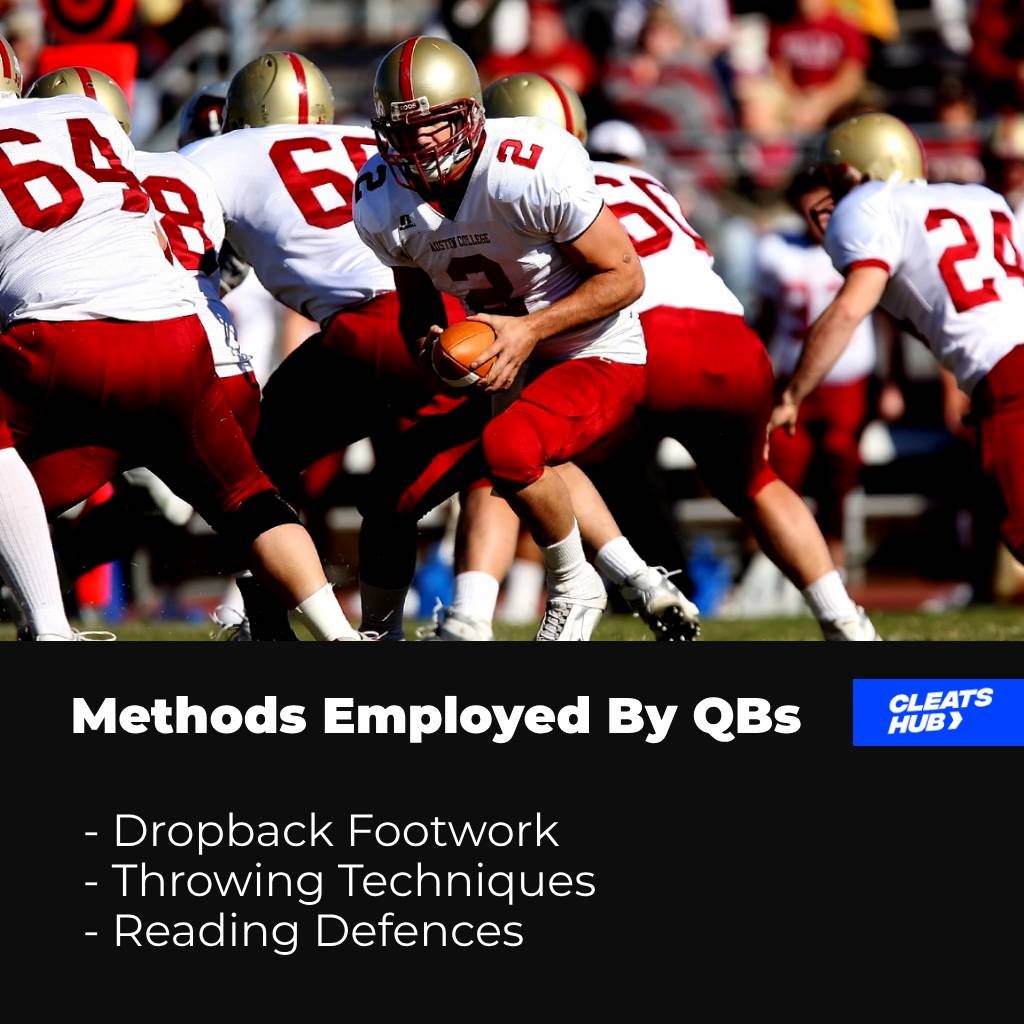
In order to flourish in their job, American football quarterbacks use a variety of strategies. Here are some essential methods used by quarterbacks:
Drop-back Footwork
Firstly, to establish the right space and timing in the pocket, quarterbacks use certain drop-back footwork techniques. Three-step, five-step, and seven-step drop-back methods are frequently used.
Additionally, these footwork techniques support quarterbacks’ balance, the development of passing lanes, and the preparation of their throws.
Throwing Techniques
Quarterbacks work on their throwing techniques to make precise and effective throws. This comprises:
- Grip: To achieve control and accuracy, the quarterback holds the ball in the right-hand position.
- Stance and Body Alignment: Quarterbacks hold themselves in a squared-off stance with their shoulders aligned and their bodies facing the target.
- Weight Transfer: The throw’s power and velocity are produced by a smooth weight transfer from the rear foot to the front foot.
- Arm Motion: An effective throwing action comprises cocking the elbow, extending the arm, and flicking the wrist to release the ball.
- Follow-through: A thorough and reliable follow-through improves the throw’s accuracy and power.
Reading Defenses
Before and after the snap, the quarterback must recognize and comprehend the defensive alignment. They assess defender placement, pinpoint coverages, and foresee probable open receivers.
Moreover, recognizing zone coverage, man-to-man matchups, and blitzes, and modifying play calls or audibles accordingly, are necessary for this.
Progression Reads
In order to evaluate several receivers on a given play, quarterbacks go through progressions. If the primary receiver is covered, they start with their primary read (the intended receiver) and go on to secondary and tertiary choices.
This calls for fast decision-making, field scanning, and spotting open targets.
Why Quarterback is the Hardest Position?
The majority of NFL executives and supporters will concur that playing quarterback is the most challenging position to perform at any level.
The quarterback position is regarded as the hardest to play in the game of football, regardless of whether it is due to pressure, the need to be a leader, or general skill.
The fact that playing quarterback is so different from playing other positions for literally many reasons. We have noted a few below:
Leader of the Offense
When you take over as the team’s starting quarterback, you must be aware of both your obligations and those of everyone else.
They must be in charge of the huddle, communicate with their teammates, and inspire the group to give their best effort.
Mental Difficulty
Before and during each play, quarterbacks must swiftly analyze a large quantity of information. They must assess the defense, foresee probable coverages, interpret defender movements, and base their split-second judgments on this knowledge.
The Media
Sadly, the media savvy of a player is becoming a more important prerequisite. The public enjoys hearing about controversies, and many people may earn a good income by advocating and publicizing them in whatever manner they can.
Well, that may depend on the individual, but with the attention you will get, there will be a cost since pressure from the NFL and general fanbase will increase.
Physical Skills
To throw passes to receivers further downfield, quarterbacks need to possess a powerful and accurate arm. Additionally, they must be agile, have outstanding footwork, and be able to elude opponents when in the pocket.
Moreover, a quarterback needs to be strong enough to complete every NFL pass, accurate enough to avoid some of the best “athletes” in the world.
Notable Quarterbacks in NFL History
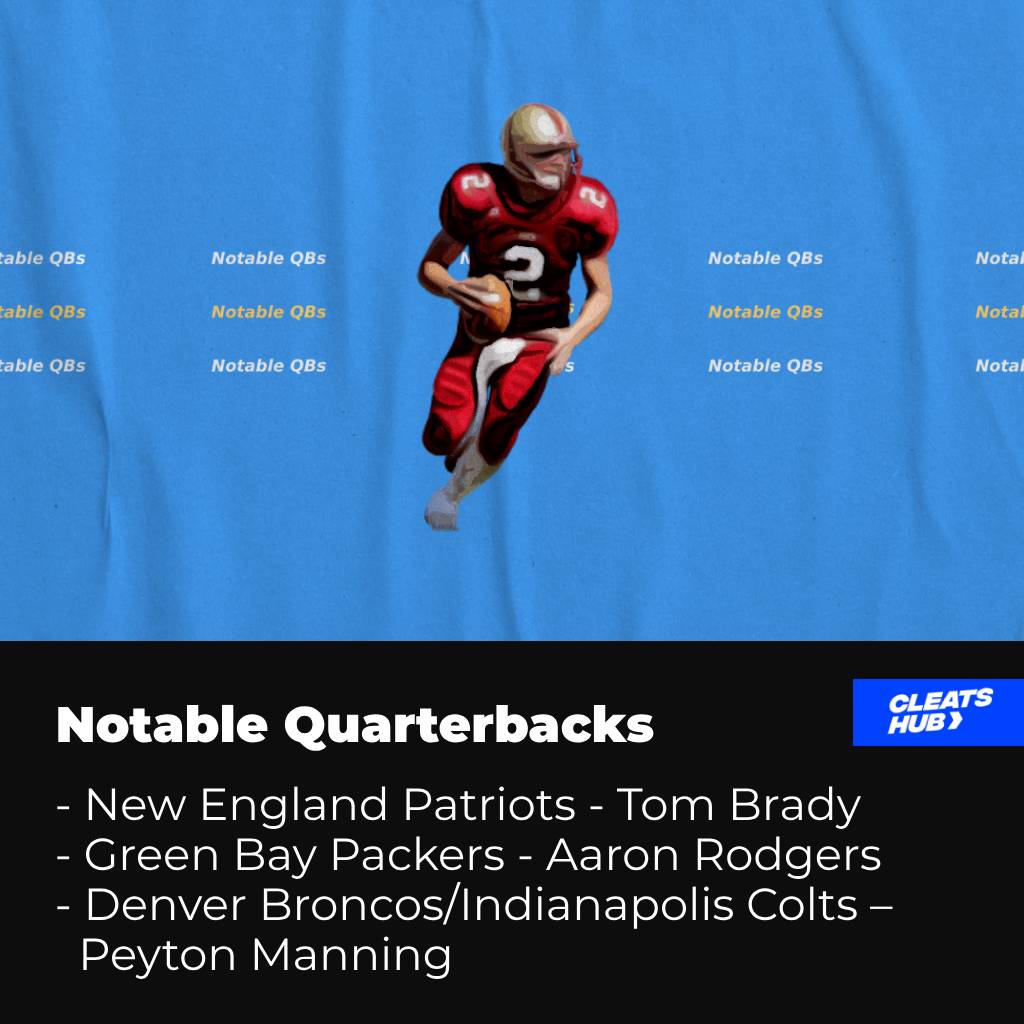
A team’s famous quarterbacks are recognized for a variety of reasons, including their performance, achievements, effects on the game, and overall legacies.
Here are a few instances of well-known quarterbacks in NFL history:
New England Patriots – Tom Brady
Tom Brady of the New England Patriots is regarded as one of the best quarterbacks of all time and played for them for most of his career.
Secondly, he boasts various NFL records including throwing yards, touchdowns, and playoff success. He also guided the franchise to multiple Super Bowl titles.
Moreover, Brady’s time with the Patriots cemented his place in history as a famous player for the team.
Green Bay Packers – Aaron Rodgers
Aaron Rodgers, quarterback for the Green Bay Packers, has made a name for himself in recent years as one of the best in the league. He has worked with the Green Bay Packers for his entire professional career, consistently guiding them to victory.
Moreover, Rodgers has won several MVP honors and led the Packers to a Super Bowl triumph.
In addition, he is renowned for his arm power, accuracy, and capacity to produce amazing throws.
Denver Broncos/Indianapolis Colts – Peyton Manning
One of the smartest quarterbacks in NFL history is largely recognized as Peyton Manning. Before concluding with the Denver Broncos, he played with the Indianapolis Colts for the duration of his career.
Additionally, Manning won two Super Bowl titles and five MVP honors thanks to his ability to read defenses, make audibles, and guide his teams to victory.
San Francisco 49ers – Joe Montana
Joe Montana, the renowned quarterback for the San Francisco 49ers who won four Super Bowls, is associated with the team.
Throughout his career, Montana personified the term “winner” thanks to his calm demeanor and clutch outings.
Moreover, he became one of the best quarterbacks in NFL history thanks to his ability to orchestrate comebacks and execute under pressure.
Dallas Cowboys – Troy Aikman and Roger Staubach
Roger Staubach and Troy Aikman were two illustrious quarterbacks for the Dallas Cowboys.
Staubach, a.k.a. “Captain America”, guided the Cowboys to two championships in the Super Bowl. He was renowned for his shrewd decision-making and ability to make significant plays.
Contrarily, Aikman led the Cowboys to three Super Bowl titles in the 1990s, building a strong alliance with the squad’s star-studded lineup.
Quarterbacks with most Rings in NFL History
| No | Player | Rings |
| 1 | Tom Brady | 7 |
| 2 | Bart Starr | 5 |
| 3 | Joe Montana | 4 |
| 4 | Terry Bradshaw | 4 |
| 5 | Earl Morrall | 4 |
| 6 | Johnny Unitas | 4 |
| 7 | Sid Luckman | 4 |
| 8 | Troy Aikman | 3 |
| 9 | Steve Young | 3 |
| 10 | Daryle Lamonica | 3 |
Conclusion
Unquestionably, the quarterback is the focal point of every football squad. They are the ultimate game-changers on the gridiron due to their abilities, leadership traits, and capacity for flexibility.
Secondly, the mesmerizing displays of athleticism and mental acumen put on by quarterbacks, from organizing game-winning drives to leading historic comebacks, never fail to enthrall spectators.

